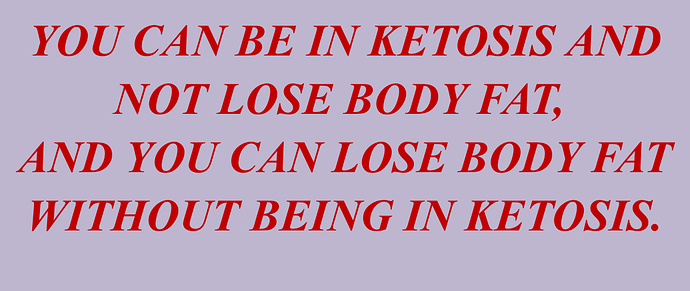
Feeling "high" with high readings?
This sounds to me that you can have high readings in a fast. After fasting 48h, my ketone readings were 6.7 (blood glucose 72). No way I was still burning dietary fat at this point. It might be not the optimal zone but I don’t think one can say that high ketone readings mean that you took too much MCT or whatever. N=1, though.
That’s what I took away from this. You have to take your context into account when considering your readings. The highest my ketone readings ever reached was 6.2 on a 6 day fast. Alternatively, my ketones can go higher (say 2.0) after a day when I have eaten bacon and scrambled eggs with extra yolks but almost no carbs.
@atomicspacebunny: Could you adress this point? This seems to fly in the face of a general statement contending that high(er) blood ketones are associated with dietary fat. I get your point: Ketones and weight loss aren’t related in a linear fashion. But the opposite isn’t true either.
My point is that your first statement sounded like “high ketone readings = dietary fat, not body fat burning”. I agree with the fact that high ketone readings don’t tell you anything about the source of the fat being burned. But I would maintain that your first statement regarding the OP is a bit misleading in that it suggests a definite answer purely on the basis of a ketone reading of 2,9. If you didn’t mean that, it’s fine. Just want to clarify.
Fasting and baseline high ketone readings (fluctuate eradicately from high to low within seconds[2]) from fasting extensively or intermittently will still result in half of the weight loss being water weight not actual adipose tissue loss (WAT/VAT) or shrinkage. So it may appear like “…hey, I lost all this weight from fasting extensively (EF), I think I’ll do it again?” The reality is, your probably going around in circles playing rewind with the metabolism if you cannot maintain a steady weight loss balance LONG-TERM[1]?
How many times I eat a day is the deciding factor (maintenance) in this, not how long long or extensively I fast for other reasons than weight loss! In my case I eat once a day if I am not physically active and being sedentary[1]!
When you are in KETOSIS you are already in a fasted state, EF only amplifies the benefits of autophagy, too much autophagy long-term will have dangerous consequences and the opposite effect of why your doing it?
Footnotes:
[1]“…But evidence shows that people who lose weight gradually and steadily (about 1 to 2 pounds per week) are more successful at keeping weight off. Healthy weight loss isn’t just about a “diet” or “program”. It’s about an ongoing lifestyle that includes long-term changes in daily eating and exercise habits.” - CDC
[2] …e.g. or simply moving, walking a lot or lifting something heavy, pump some iron then go back and check your blood ketone levels, they will drop like a rock (glycogen stores being depleted from skeletal muscle tissue and converted into glucose) and with a hiking peak in glucose numbers.

